Julius Baer is expanding in the U.K., despite Brexit. David Durlacher, who is in charge of the business in the country, explains how the bank intends to become profitable.
By Shruti Advani, Editor-at-large, finews.asia
I ask an acquaintance who has been in private banking for as long as I have known her about David Durlacher, chief executive of Julius Baer International and she says he is «a really nice guy». I’m a bit of a sceptic when it comes to nice guys leading big banks through the not-so-nice times we live in so it is with more than the usual reluctance that I trudge to the bank’s offices in the city to meet the man in question. And it is with some surprise that I discover Durlacher is a man born to lead.
Few Clients Talk About Brexit
«There will undoubtedly be sections of the economy that will not benefit from a hard Brexit,» he says. «But Brexit is not a global phenomenon and the global picture is a very different one,» he insists, adding that «very few clients still talk about Brexit.»
The words may well be a balm for those of us who are weary from the daily headlines predicting doom and gloom. «The UK looks different today than it used to,» he concedes, «but it continues to pull above its weight on the global stage.»
The South Is Overbanked
Descended from an old British-banking family himself, Durlacher balks at the idea of discussing dollar targets but industry estimates peg breakeven for most private banks at $20 billion and the media has already made much of the fact that the bank intends to meet this mark by 2020, which would require assets under management to jump 43 percent from where they are now. Durlacher has taken a two-pronged approach – investing in the bank’s discretionary platform; mining assets in the North rather than chasing them in London or the South which are both overbanked.
«We are seeing a real shift in the landscape of where wealth is being created – manufacturing heartlands in the North of the country are booming because of a weak sterling,» he says.
Under his aegis, the bank has identified Manchester, Leeds, Glasgow and Belfast as priority markets. These regional clients are different from those in London in that they have the majority of their assets with the bank in a discretionary platform.
Advisory Platform: a Priority
Not surprisingly then, bolstering its advisory platform is a priority for the bank. «On average, discretionary assets account for 40 percent of total assets,» he estimates. «But regional clients have the majority of their assets in discretionary accounts, only allocating some of their assets to short-term, tactical opportunities.»
Durlacher describes what he sees as an industry-wide reticence to invest in advisory platforms. «We are very different from our peers in that we have invested a very large amount of money in these advisory tools,» he asserts. «These investments maintain the speed and quality of advice that clients can expect from Julius Baer as well as take care of the regulatory and daily reporting and record-keeping requirements.»
But the platform goes beyond these basics. «We have introduced a sophisticated risk-modelling functionality that allows relationship managers to see risk on a real-time basis. At the end of this year we will have the most efficient advisory platform in the U.K.,» Durlacher enthuses.
No Unnecessary Risks Taken
Surely though, clients care more about performance than they about platforms? «We have one of the leading discretionary returns on the market, not just on the basis of absolute returns but also on Sharpe Ratios, so we are not taking unnecessary risks to generate these returns,» he says.
Sensing this is an oft-repeated phrase I ask whether it is the hook to reel clients in. «The hook easily could be our capability – our discretionary capability, our continued investment in our advisory platform, our global reach. But it is in fact our culture, a 150-year old culture of caring for people. Our Swissness means we look after our business, we don’t take unnecessary risks, we pay attention to details,» he says. «We care about our client experience, we care about our employee experience and that really sets us aside in the UK market.»
Investment Phase
Could it be the rumored premium salaries that Julius Baer pays that contribute to employee experience, I wonder. «We don’t pay a premium to market,» Durlacher clarifies, «because if we wanted to attract people based just on compensation, we would lose them quickly.»
Many of Durlacher’s most recent hires have been from Barclays Wealth and the Royal Bank of Scotland, and to his credit, it is a fair assumption they left the two institutions because of ambiguity towards private banking rather than higher bids elsewhere.
However, even if it does pay salaries in line with industry standards rather than at a premium, it is likely that Julius Baer is still in «investment phase», an industry euphemism used by rapidly expanding private banks who have spent much on bolstering the front end of the business and are still waiting for those investments to pay off. «Yes we are indeed in investment phase,» says Durlacher, «we are investing in new offices, in our back-office, in recruitment .. but we have not invested unwisely. We have invested in a way an entrepreneur would choose to invest in their own business.»
Does that signal the end of the swanky office and even swankier expense account – breed of private banking? Durlacher thinks so. «Clients want us to be careful about our own investments – I would much prefer to invest in people than in some swanky office.»

































